Organisational Behaviour Report: Rosewood Hotel, Semester 1, 2024
VerifiedAdded on 2023/01/12
|22
|7595
|52
Report
AI Summary
This report provides a detailed analysis of organisational behaviour, focusing on the case of Rosewood Hotels. It begins by defining organisational behaviour and its impact on employee performance, then delves into the influence of organisational culture, power dynamics, and politics on individual and team behaviour. The report examines various cultural dimensions and power types within the context of Rosewood Hotels. It further explores content and process theories of motivation, evaluating their application in influencing employee behaviour. Effective and ineffective teams are compared, and team development theories are analyzed for their role in fostering cooperation within the hotel. Finally, the report evaluates organisational behaviour theories and practices in relation to leadership skill development, concluding with an assessment of the interplay between culture, power, politics, and motivational theories in enabling team and organisational success. The report draws on theoretical frameworks and real-world examples to provide a comprehensive understanding of organisational behaviour principles.
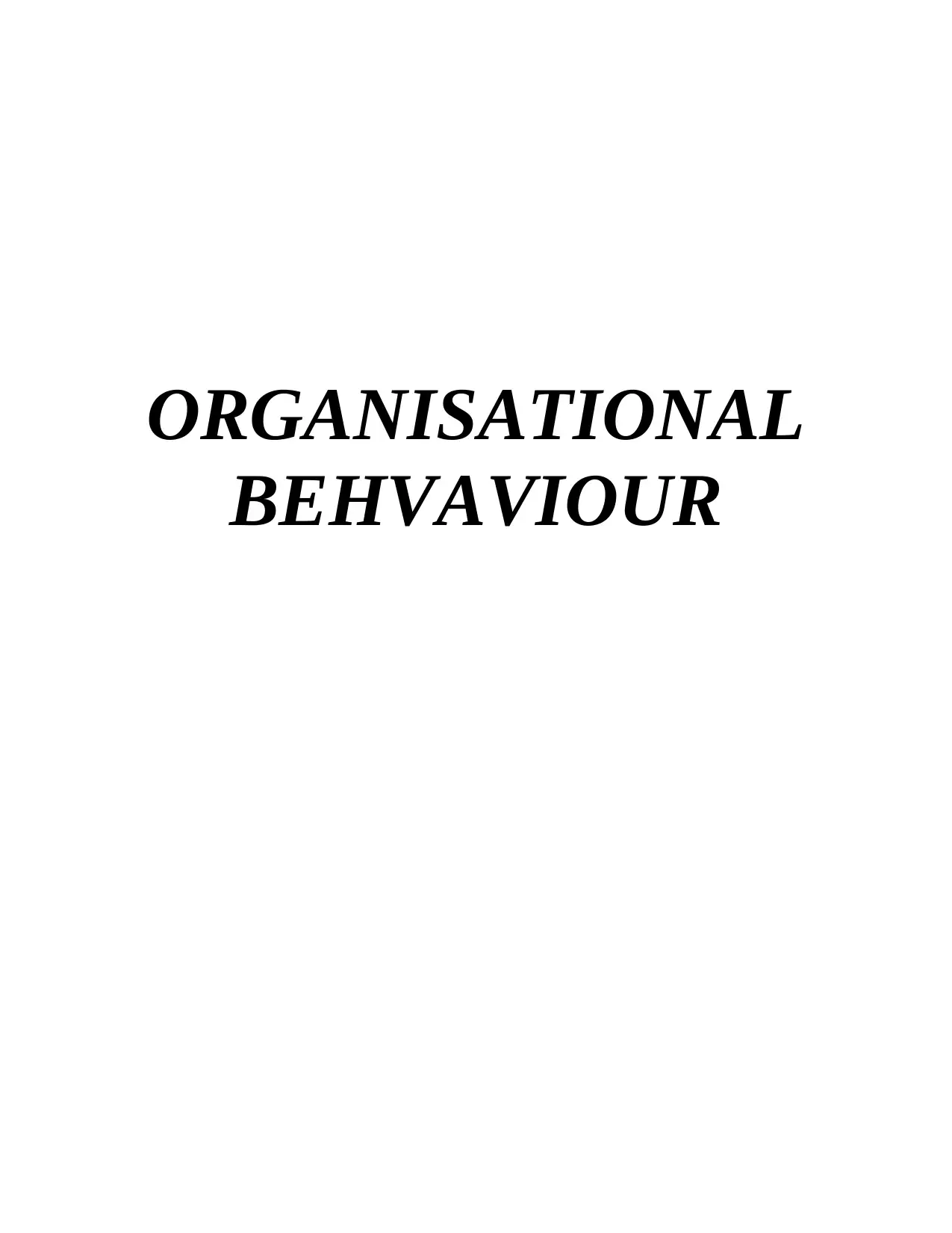
ORGANISATIONAL
BEHVAVIOUR
BEHVAVIOUR
Paraphrase This Document
Need a fresh take? Get an instant paraphrase of this document with our AI Paraphraser
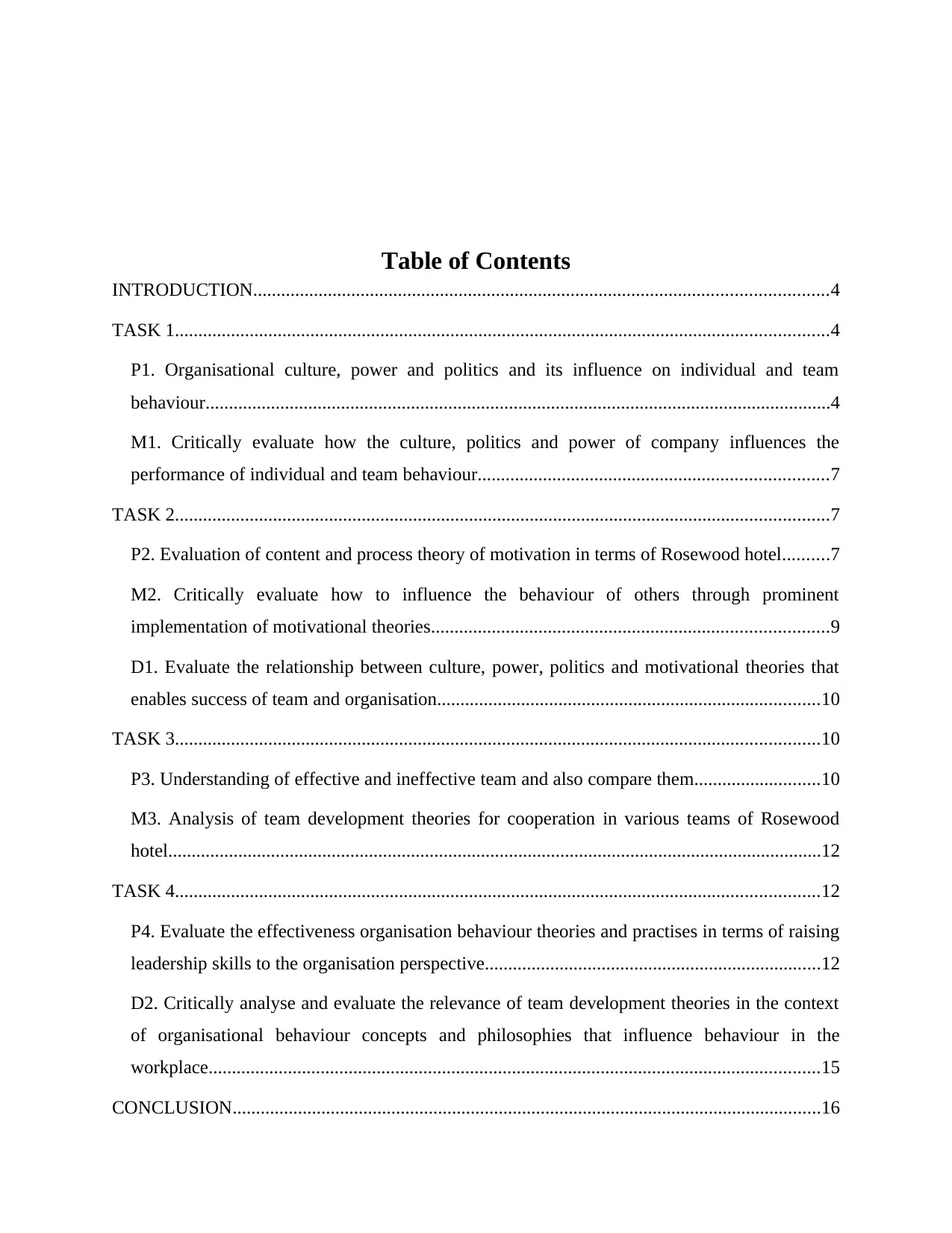
Table of Contents
INTRODUCTION...........................................................................................................................4
TASK 1............................................................................................................................................4
P1. Organisational culture, power and politics and its influence on individual and team
behaviour......................................................................................................................................4
M1. Critically evaluate how the culture, politics and power of company influences the
performance of individual and team behaviour...........................................................................7
TASK 2............................................................................................................................................7
P2. Evaluation of content and process theory of motivation in terms of Rosewood hotel..........7
M2. Critically evaluate how to influence the behaviour of others through prominent
implementation of motivational theories.....................................................................................9
D1. Evaluate the relationship between culture, power, politics and motivational theories that
enables success of team and organisation..................................................................................10
TASK 3..........................................................................................................................................10
P3. Understanding of effective and ineffective team and also compare them...........................10
M3. Analysis of team development theories for cooperation in various teams of Rosewood
hotel............................................................................................................................................12
TASK 4..........................................................................................................................................12
P4. Evaluate the effectiveness organisation behaviour theories and practises in terms of raising
leadership skills to the organisation perspective........................................................................12
D2. Critically analyse and evaluate the relevance of team development theories in the context
of organisational behaviour concepts and philosophies that influence behaviour in the
workplace...................................................................................................................................15
CONCLUSION..............................................................................................................................16
INTRODUCTION...........................................................................................................................4
TASK 1............................................................................................................................................4
P1. Organisational culture, power and politics and its influence on individual and team
behaviour......................................................................................................................................4
M1. Critically evaluate how the culture, politics and power of company influences the
performance of individual and team behaviour...........................................................................7
TASK 2............................................................................................................................................7
P2. Evaluation of content and process theory of motivation in terms of Rosewood hotel..........7
M2. Critically evaluate how to influence the behaviour of others through prominent
implementation of motivational theories.....................................................................................9
D1. Evaluate the relationship between culture, power, politics and motivational theories that
enables success of team and organisation..................................................................................10
TASK 3..........................................................................................................................................10
P3. Understanding of effective and ineffective team and also compare them...........................10
M3. Analysis of team development theories for cooperation in various teams of Rosewood
hotel............................................................................................................................................12
TASK 4..........................................................................................................................................12
P4. Evaluate the effectiveness organisation behaviour theories and practises in terms of raising
leadership skills to the organisation perspective........................................................................12
D2. Critically analyse and evaluate the relevance of team development theories in the context
of organisational behaviour concepts and philosophies that influence behaviour in the
workplace...................................................................................................................................15
CONCLUSION..............................................................................................................................16
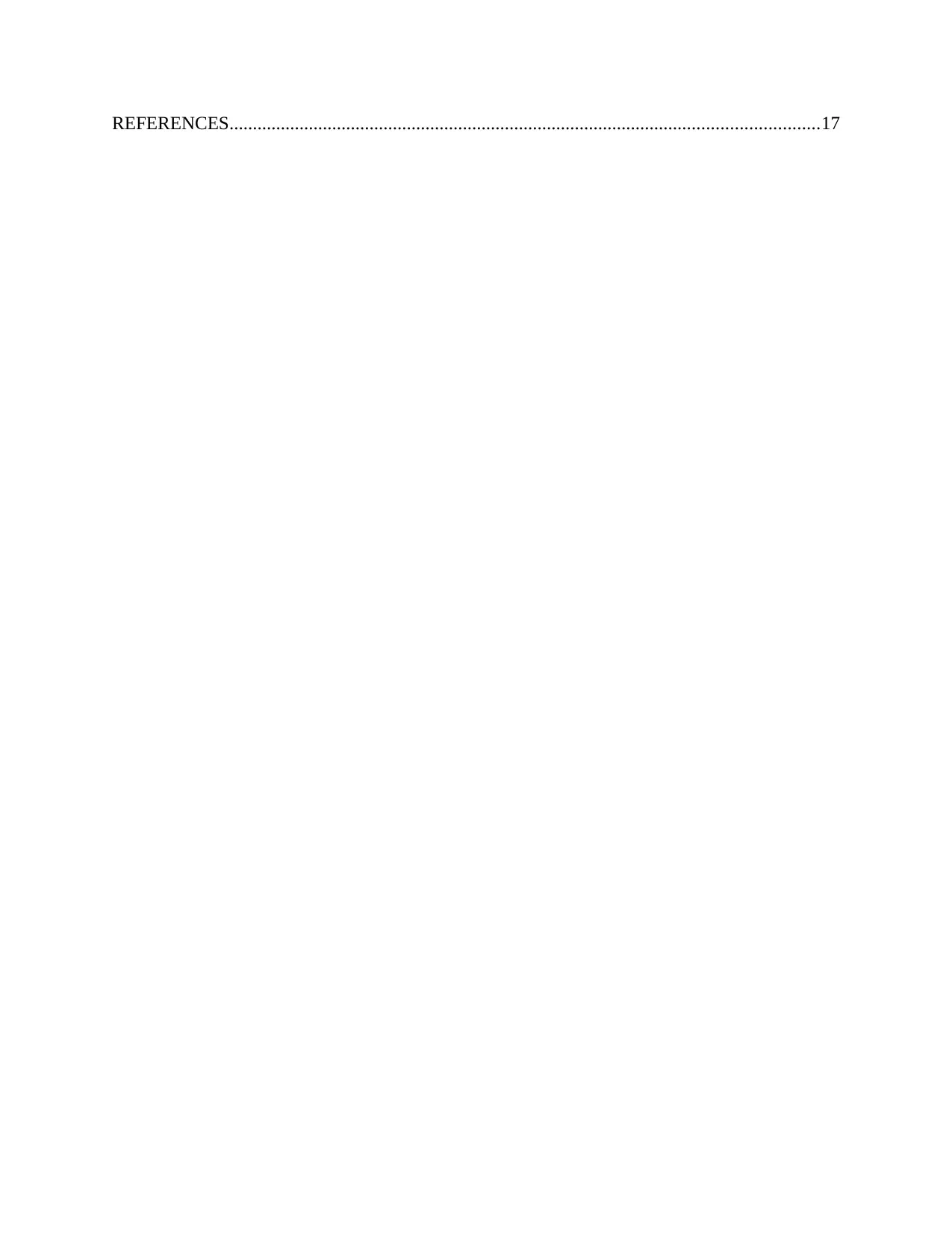
REFERENCES..............................................................................................................................17
⊘ This is a preview!⊘
Do you want full access?
Subscribe today to unlock all pages.

Trusted by 1+ million students worldwide
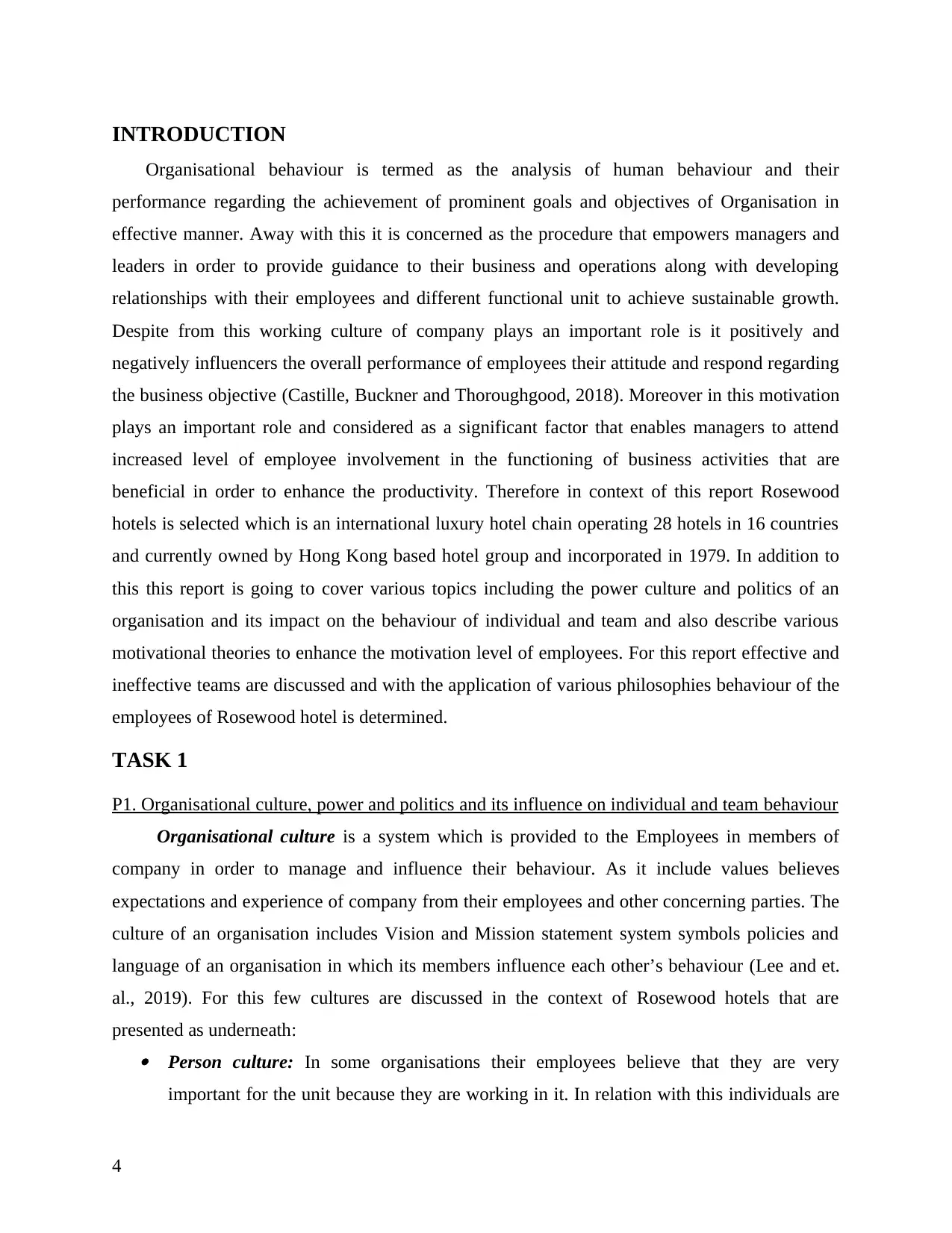
INTRODUCTION
Organisational behaviour is termed as the analysis of human behaviour and their
performance regarding the achievement of prominent goals and objectives of Organisation in
effective manner. Away with this it is concerned as the procedure that empowers managers and
leaders in order to provide guidance to their business and operations along with developing
relationships with their employees and different functional unit to achieve sustainable growth.
Despite from this working culture of company plays an important role is it positively and
negatively influencers the overall performance of employees their attitude and respond regarding
the business objective (Castille, Buckner and Thoroughgood, 2018). Moreover in this motivation
plays an important role and considered as a significant factor that enables managers to attend
increased level of employee involvement in the functioning of business activities that are
beneficial in order to enhance the productivity. Therefore in context of this report Rosewood
hotels is selected which is an international luxury hotel chain operating 28 hotels in 16 countries
and currently owned by Hong Kong based hotel group and incorporated in 1979. In addition to
this this report is going to cover various topics including the power culture and politics of an
organisation and its impact on the behaviour of individual and team and also describe various
motivational theories to enhance the motivation level of employees. For this report effective and
ineffective teams are discussed and with the application of various philosophies behaviour of the
employees of Rosewood hotel is determined.
TASK 1
P1. Organisational culture, power and politics and its influence on individual and team behaviour
Organisational culture is a system which is provided to the Employees in members of
company in order to manage and influence their behaviour. As it include values believes
expectations and experience of company from their employees and other concerning parties. The
culture of an organisation includes Vision and Mission statement system symbols policies and
language of an organisation in which its members influence each other’s behaviour (Lee and et.
al., 2019). For this few cultures are discussed in the context of Rosewood hotels that are
presented as underneath: Person culture: In some organisations their employees believe that they are very
important for the unit because they are working in it. In relation with this individuals are
4
Organisational behaviour is termed as the analysis of human behaviour and their
performance regarding the achievement of prominent goals and objectives of Organisation in
effective manner. Away with this it is concerned as the procedure that empowers managers and
leaders in order to provide guidance to their business and operations along with developing
relationships with their employees and different functional unit to achieve sustainable growth.
Despite from this working culture of company plays an important role is it positively and
negatively influencers the overall performance of employees their attitude and respond regarding
the business objective (Castille, Buckner and Thoroughgood, 2018). Moreover in this motivation
plays an important role and considered as a significant factor that enables managers to attend
increased level of employee involvement in the functioning of business activities that are
beneficial in order to enhance the productivity. Therefore in context of this report Rosewood
hotels is selected which is an international luxury hotel chain operating 28 hotels in 16 countries
and currently owned by Hong Kong based hotel group and incorporated in 1979. In addition to
this this report is going to cover various topics including the power culture and politics of an
organisation and its impact on the behaviour of individual and team and also describe various
motivational theories to enhance the motivation level of employees. For this report effective and
ineffective teams are discussed and with the application of various philosophies behaviour of the
employees of Rosewood hotel is determined.
TASK 1
P1. Organisational culture, power and politics and its influence on individual and team behaviour
Organisational culture is a system which is provided to the Employees in members of
company in order to manage and influence their behaviour. As it include values believes
expectations and experience of company from their employees and other concerning parties. The
culture of an organisation includes Vision and Mission statement system symbols policies and
language of an organisation in which its members influence each other’s behaviour (Lee and et.
al., 2019). For this few cultures are discussed in the context of Rosewood hotels that are
presented as underneath: Person culture: In some organisations their employees believe that they are very
important for the unit because they are working in it. In relation with this individuals are
4
Paraphrase This Document
Need a fresh take? Get an instant paraphrase of this document with our AI Paraphraser
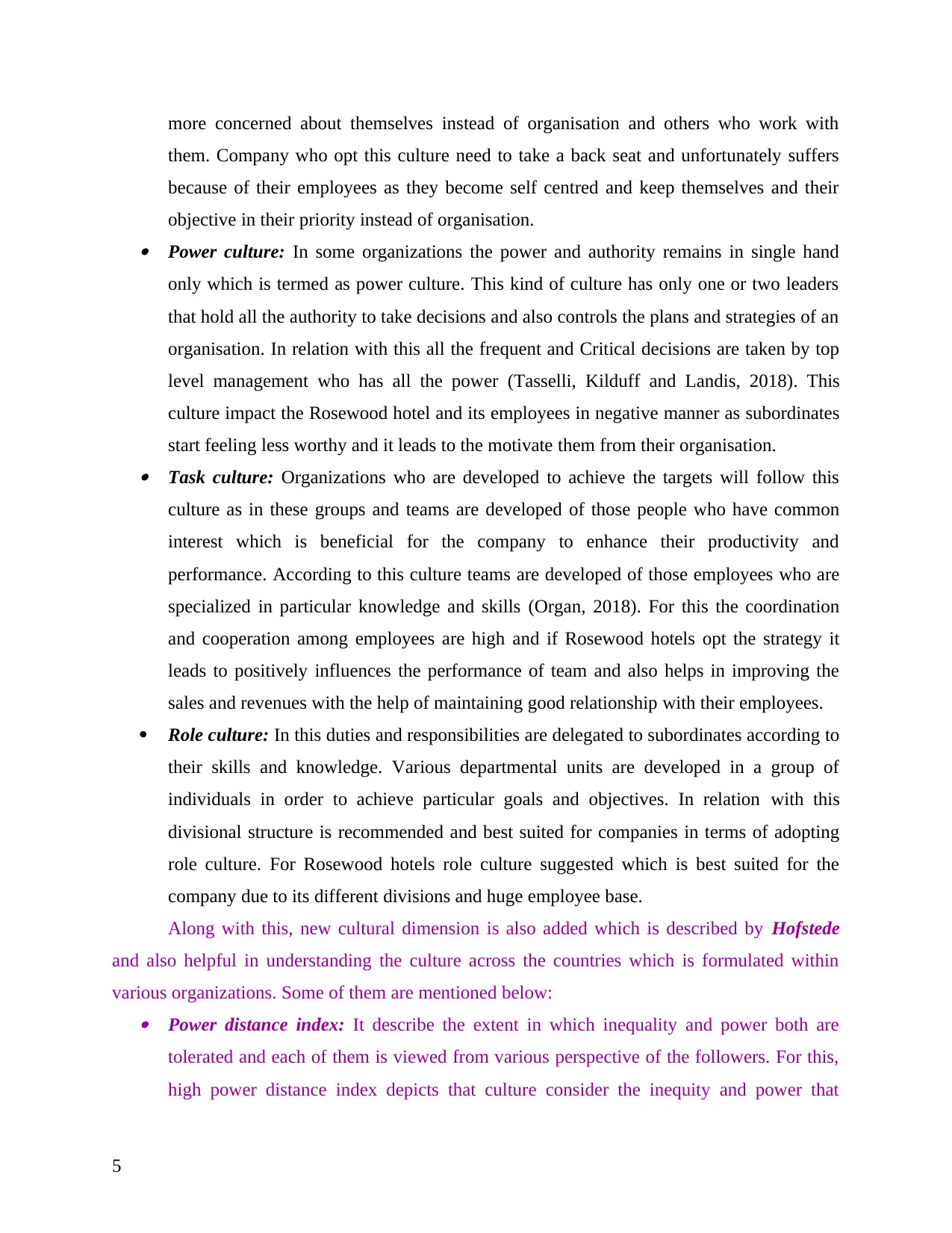
more concerned about themselves instead of organisation and others who work with
them. Company who opt this culture need to take a back seat and unfortunately suffers
because of their employees as they become self centred and keep themselves and their
objective in their priority instead of organisation. Power culture: In some organizations the power and authority remains in single hand
only which is termed as power culture. This kind of culture has only one or two leaders
that hold all the authority to take decisions and also controls the plans and strategies of an
organisation. In relation with this all the frequent and Critical decisions are taken by top
level management who has all the power (Tasselli, Kilduff and Landis, 2018). This
culture impact the Rosewood hotel and its employees in negative manner as subordinates
start feeling less worthy and it leads to the motivate them from their organisation. Task culture: Organizations who are developed to achieve the targets will follow this
culture as in these groups and teams are developed of those people who have common
interest which is beneficial for the company to enhance their productivity and
performance. According to this culture teams are developed of those employees who are
specialized in particular knowledge and skills (Organ, 2018). For this the coordination
and cooperation among employees are high and if Rosewood hotels opt the strategy it
leads to positively influences the performance of team and also helps in improving the
sales and revenues with the help of maintaining good relationship with their employees.
Role culture: In this duties and responsibilities are delegated to subordinates according to
their skills and knowledge. Various departmental units are developed in a group of
individuals in order to achieve particular goals and objectives. In relation with this
divisional structure is recommended and best suited for companies in terms of adopting
role culture. For Rosewood hotels role culture suggested which is best suited for the
company due to its different divisions and huge employee base.
Along with this, new cultural dimension is also added which is described by Hofstede
and also helpful in understanding the culture across the countries which is formulated within
various organizations. Some of them are mentioned below: Power distance index: It describe the extent in which inequality and power both are
tolerated and each of them is viewed from various perspective of the followers. For this,
high power distance index depicts that culture consider the inequity and power that
5
them. Company who opt this culture need to take a back seat and unfortunately suffers
because of their employees as they become self centred and keep themselves and their
objective in their priority instead of organisation. Power culture: In some organizations the power and authority remains in single hand
only which is termed as power culture. This kind of culture has only one or two leaders
that hold all the authority to take decisions and also controls the plans and strategies of an
organisation. In relation with this all the frequent and Critical decisions are taken by top
level management who has all the power (Tasselli, Kilduff and Landis, 2018). This
culture impact the Rosewood hotel and its employees in negative manner as subordinates
start feeling less worthy and it leads to the motivate them from their organisation. Task culture: Organizations who are developed to achieve the targets will follow this
culture as in these groups and teams are developed of those people who have common
interest which is beneficial for the company to enhance their productivity and
performance. According to this culture teams are developed of those employees who are
specialized in particular knowledge and skills (Organ, 2018). For this the coordination
and cooperation among employees are high and if Rosewood hotels opt the strategy it
leads to positively influences the performance of team and also helps in improving the
sales and revenues with the help of maintaining good relationship with their employees.
Role culture: In this duties and responsibilities are delegated to subordinates according to
their skills and knowledge. Various departmental units are developed in a group of
individuals in order to achieve particular goals and objectives. In relation with this
divisional structure is recommended and best suited for companies in terms of adopting
role culture. For Rosewood hotels role culture suggested which is best suited for the
company due to its different divisions and huge employee base.
Along with this, new cultural dimension is also added which is described by Hofstede
and also helpful in understanding the culture across the countries which is formulated within
various organizations. Some of them are mentioned below: Power distance index: It describe the extent in which inequality and power both are
tolerated and each of them is viewed from various perspective of the followers. For this,
high power distance index depicts that culture consider the inequity and power that
5
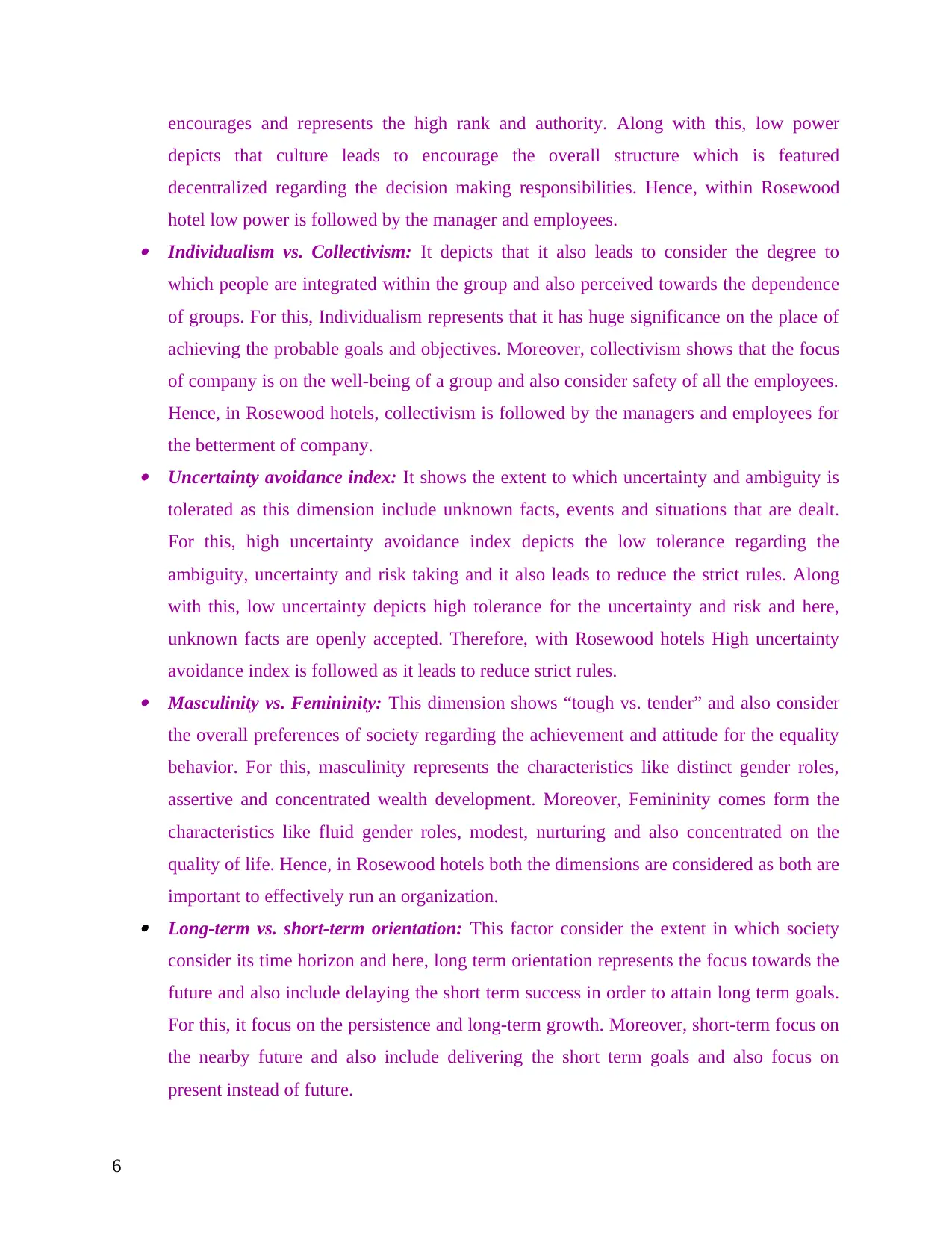
encourages and represents the high rank and authority. Along with this, low power
depicts that culture leads to encourage the overall structure which is featured
decentralized regarding the decision making responsibilities. Hence, within Rosewood
hotel low power is followed by the manager and employees. Individualism vs. Collectivism: It depicts that it also leads to consider the degree to
which people are integrated within the group and also perceived towards the dependence
of groups. For this, Individualism represents that it has huge significance on the place of
achieving the probable goals and objectives. Moreover, collectivism shows that the focus
of company is on the well-being of a group and also consider safety of all the employees.
Hence, in Rosewood hotels, collectivism is followed by the managers and employees for
the betterment of company. Uncertainty avoidance index: It shows the extent to which uncertainty and ambiguity is
tolerated as this dimension include unknown facts, events and situations that are dealt.
For this, high uncertainty avoidance index depicts the low tolerance regarding the
ambiguity, uncertainty and risk taking and it also leads to reduce the strict rules. Along
with this, low uncertainty depicts high tolerance for the uncertainty and risk and here,
unknown facts are openly accepted. Therefore, with Rosewood hotels High uncertainty
avoidance index is followed as it leads to reduce strict rules. Masculinity vs. Femininity: This dimension shows “tough vs. tender” and also consider
the overall preferences of society regarding the achievement and attitude for the equality
behavior. For this, masculinity represents the characteristics like distinct gender roles,
assertive and concentrated wealth development. Moreover, Femininity comes form the
characteristics like fluid gender roles, modest, nurturing and also concentrated on the
quality of life. Hence, in Rosewood hotels both the dimensions are considered as both are
important to effectively run an organization. Long-term vs. short-term orientation: This factor consider the extent in which society
consider its time horizon and here, long term orientation represents the focus towards the
future and also include delaying the short term success in order to attain long term goals.
For this, it focus on the persistence and long-term growth. Moreover, short-term focus on
the nearby future and also include delivering the short term goals and also focus on
present instead of future.
6
depicts that culture leads to encourage the overall structure which is featured
decentralized regarding the decision making responsibilities. Hence, within Rosewood
hotel low power is followed by the manager and employees. Individualism vs. Collectivism: It depicts that it also leads to consider the degree to
which people are integrated within the group and also perceived towards the dependence
of groups. For this, Individualism represents that it has huge significance on the place of
achieving the probable goals and objectives. Moreover, collectivism shows that the focus
of company is on the well-being of a group and also consider safety of all the employees.
Hence, in Rosewood hotels, collectivism is followed by the managers and employees for
the betterment of company. Uncertainty avoidance index: It shows the extent to which uncertainty and ambiguity is
tolerated as this dimension include unknown facts, events and situations that are dealt.
For this, high uncertainty avoidance index depicts the low tolerance regarding the
ambiguity, uncertainty and risk taking and it also leads to reduce the strict rules. Along
with this, low uncertainty depicts high tolerance for the uncertainty and risk and here,
unknown facts are openly accepted. Therefore, with Rosewood hotels High uncertainty
avoidance index is followed as it leads to reduce strict rules. Masculinity vs. Femininity: This dimension shows “tough vs. tender” and also consider
the overall preferences of society regarding the achievement and attitude for the equality
behavior. For this, masculinity represents the characteristics like distinct gender roles,
assertive and concentrated wealth development. Moreover, Femininity comes form the
characteristics like fluid gender roles, modest, nurturing and also concentrated on the
quality of life. Hence, in Rosewood hotels both the dimensions are considered as both are
important to effectively run an organization. Long-term vs. short-term orientation: This factor consider the extent in which society
consider its time horizon and here, long term orientation represents the focus towards the
future and also include delaying the short term success in order to attain long term goals.
For this, it focus on the persistence and long-term growth. Moreover, short-term focus on
the nearby future and also include delivering the short term goals and also focus on
present instead of future.
6
⊘ This is a preview!⊘
Do you want full access?
Subscribe today to unlock all pages.

Trusted by 1+ million students worldwide
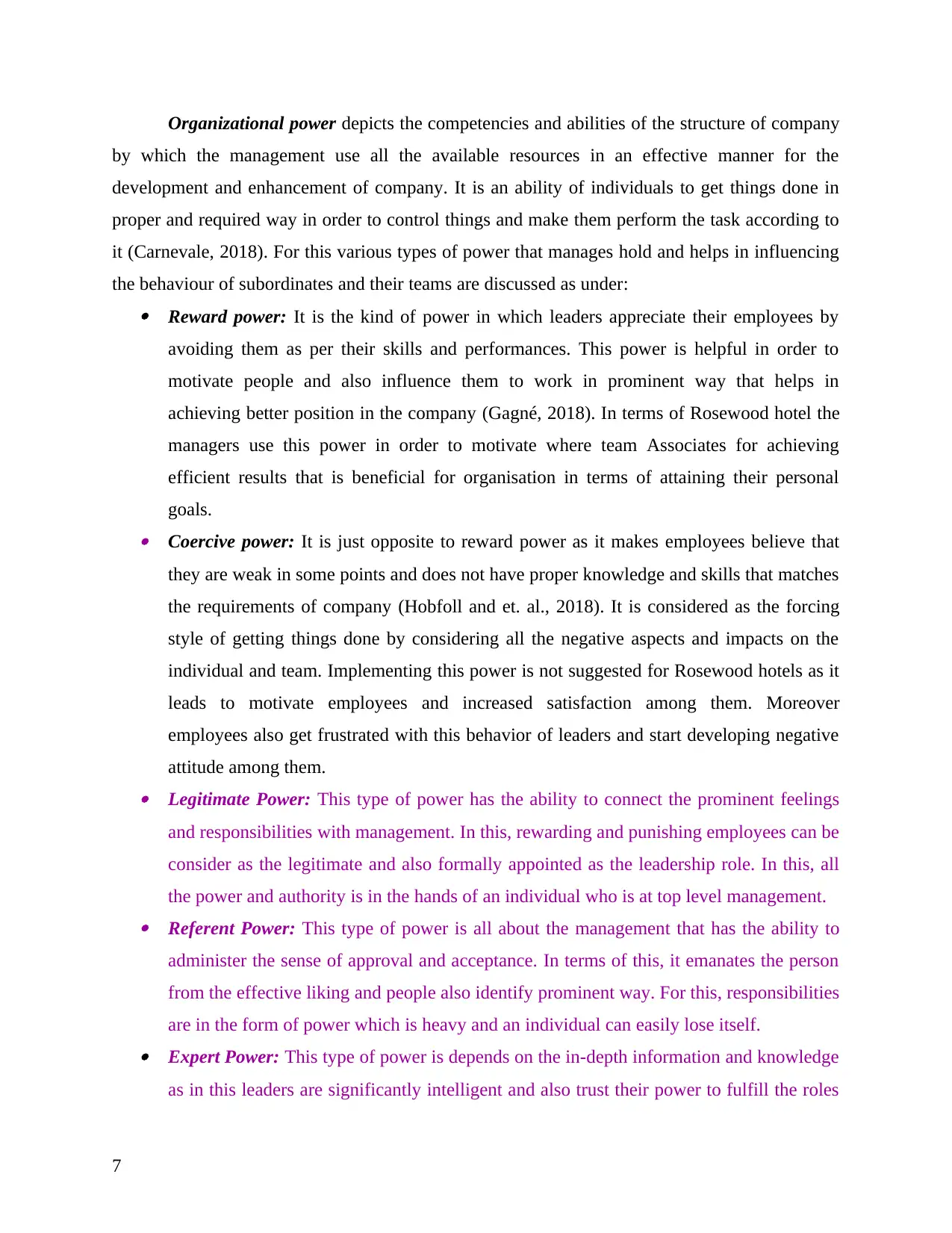
Organizational power depicts the competencies and abilities of the structure of company
by which the management use all the available resources in an effective manner for the
development and enhancement of company. It is an ability of individuals to get things done in
proper and required way in order to control things and make them perform the task according to
it (Carnevale, 2018). For this various types of power that manages hold and helps in influencing
the behaviour of subordinates and their teams are discussed as under: Reward power: It is the kind of power in which leaders appreciate their employees by
avoiding them as per their skills and performances. This power is helpful in order to
motivate people and also influence them to work in prominent way that helps in
achieving better position in the company (Gagné, 2018). In terms of Rosewood hotel the
managers use this power in order to motivate where team Associates for achieving
efficient results that is beneficial for organisation in terms of attaining their personal
goals. Coercive power: It is just opposite to reward power as it makes employees believe that
they are weak in some points and does not have proper knowledge and skills that matches
the requirements of company (Hobfoll and et. al., 2018). It is considered as the forcing
style of getting things done by considering all the negative aspects and impacts on the
individual and team. Implementing this power is not suggested for Rosewood hotels as it
leads to motivate employees and increased satisfaction among them. Moreover
employees also get frustrated with this behavior of leaders and start developing negative
attitude among them. Legitimate Power: This type of power has the ability to connect the prominent feelings
and responsibilities with management. In this, rewarding and punishing employees can be
consider as the legitimate and also formally appointed as the leadership role. In this, all
the power and authority is in the hands of an individual who is at top level management. Referent Power: This type of power is all about the management that has the ability to
administer the sense of approval and acceptance. In terms of this, it emanates the person
from the effective liking and people also identify prominent way. For this, responsibilities
are in the form of power which is heavy and an individual can easily lose itself. Expert Power: This type of power is depends on the in-depth information and knowledge
as in this leaders are significantly intelligent and also trust their power to fulfill the roles
7
by which the management use all the available resources in an effective manner for the
development and enhancement of company. It is an ability of individuals to get things done in
proper and required way in order to control things and make them perform the task according to
it (Carnevale, 2018). For this various types of power that manages hold and helps in influencing
the behaviour of subordinates and their teams are discussed as under: Reward power: It is the kind of power in which leaders appreciate their employees by
avoiding them as per their skills and performances. This power is helpful in order to
motivate people and also influence them to work in prominent way that helps in
achieving better position in the company (Gagné, 2018). In terms of Rosewood hotel the
managers use this power in order to motivate where team Associates for achieving
efficient results that is beneficial for organisation in terms of attaining their personal
goals. Coercive power: It is just opposite to reward power as it makes employees believe that
they are weak in some points and does not have proper knowledge and skills that matches
the requirements of company (Hobfoll and et. al., 2018). It is considered as the forcing
style of getting things done by considering all the negative aspects and impacts on the
individual and team. Implementing this power is not suggested for Rosewood hotels as it
leads to motivate employees and increased satisfaction among them. Moreover
employees also get frustrated with this behavior of leaders and start developing negative
attitude among them. Legitimate Power: This type of power has the ability to connect the prominent feelings
and responsibilities with management. In this, rewarding and punishing employees can be
consider as the legitimate and also formally appointed as the leadership role. In this, all
the power and authority is in the hands of an individual who is at top level management. Referent Power: This type of power is all about the management that has the ability to
administer the sense of approval and acceptance. In terms of this, it emanates the person
from the effective liking and people also identify prominent way. For this, responsibilities
are in the form of power which is heavy and an individual can easily lose itself. Expert Power: This type of power is depends on the in-depth information and knowledge
as in this leaders are significantly intelligent and also trust their power to fulfill the roles
7
Paraphrase This Document
Need a fresh take? Get an instant paraphrase of this document with our AI Paraphraser
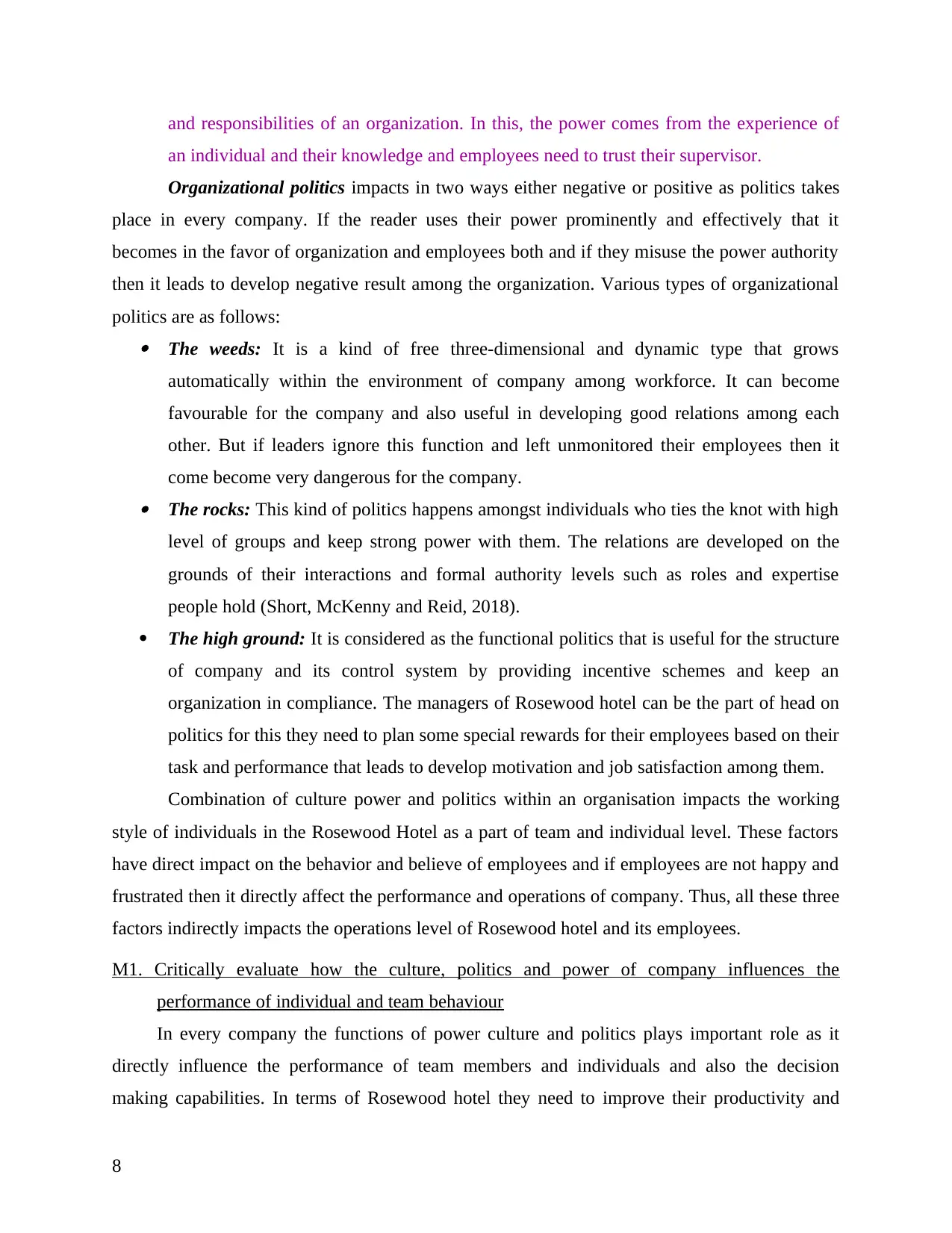
and responsibilities of an organization. In this, the power comes from the experience of
an individual and their knowledge and employees need to trust their supervisor.
Organizational politics impacts in two ways either negative or positive as politics takes
place in every company. If the reader uses their power prominently and effectively that it
becomes in the favor of organization and employees both and if they misuse the power authority
then it leads to develop negative result among the organization. Various types of organizational
politics are as follows: The weeds: It is a kind of free three-dimensional and dynamic type that grows
automatically within the environment of company among workforce. It can become
favourable for the company and also useful in developing good relations among each
other. But if leaders ignore this function and left unmonitored their employees then it
come become very dangerous for the company. The rocks: This kind of politics happens amongst individuals who ties the knot with high
level of groups and keep strong power with them. The relations are developed on the
grounds of their interactions and formal authority levels such as roles and expertise
people hold (Short, McKenny and Reid, 2018).
The high ground: It is considered as the functional politics that is useful for the structure
of company and its control system by providing incentive schemes and keep an
organization in compliance. The managers of Rosewood hotel can be the part of head on
politics for this they need to plan some special rewards for their employees based on their
task and performance that leads to develop motivation and job satisfaction among them.
Combination of culture power and politics within an organisation impacts the working
style of individuals in the Rosewood Hotel as a part of team and individual level. These factors
have direct impact on the behavior and believe of employees and if employees are not happy and
frustrated then it directly affect the performance and operations of company. Thus, all these three
factors indirectly impacts the operations level of Rosewood hotel and its employees.
M1. Critically evaluate how the culture, politics and power of company influences the
performance of individual and team behaviour
In every company the functions of power culture and politics plays important role as it
directly influence the performance of team members and individuals and also the decision
making capabilities. In terms of Rosewood hotel they need to improve their productivity and
8
an individual and their knowledge and employees need to trust their supervisor.
Organizational politics impacts in two ways either negative or positive as politics takes
place in every company. If the reader uses their power prominently and effectively that it
becomes in the favor of organization and employees both and if they misuse the power authority
then it leads to develop negative result among the organization. Various types of organizational
politics are as follows: The weeds: It is a kind of free three-dimensional and dynamic type that grows
automatically within the environment of company among workforce. It can become
favourable for the company and also useful in developing good relations among each
other. But if leaders ignore this function and left unmonitored their employees then it
come become very dangerous for the company. The rocks: This kind of politics happens amongst individuals who ties the knot with high
level of groups and keep strong power with them. The relations are developed on the
grounds of their interactions and formal authority levels such as roles and expertise
people hold (Short, McKenny and Reid, 2018).
The high ground: It is considered as the functional politics that is useful for the structure
of company and its control system by providing incentive schemes and keep an
organization in compliance. The managers of Rosewood hotel can be the part of head on
politics for this they need to plan some special rewards for their employees based on their
task and performance that leads to develop motivation and job satisfaction among them.
Combination of culture power and politics within an organisation impacts the working
style of individuals in the Rosewood Hotel as a part of team and individual level. These factors
have direct impact on the behavior and believe of employees and if employees are not happy and
frustrated then it directly affect the performance and operations of company. Thus, all these three
factors indirectly impacts the operations level of Rosewood hotel and its employees.
M1. Critically evaluate how the culture, politics and power of company influences the
performance of individual and team behaviour
In every company the functions of power culture and politics plays important role as it
directly influence the performance of team members and individuals and also the decision
making capabilities. In terms of Rosewood hotel they need to improve their productivity and
8
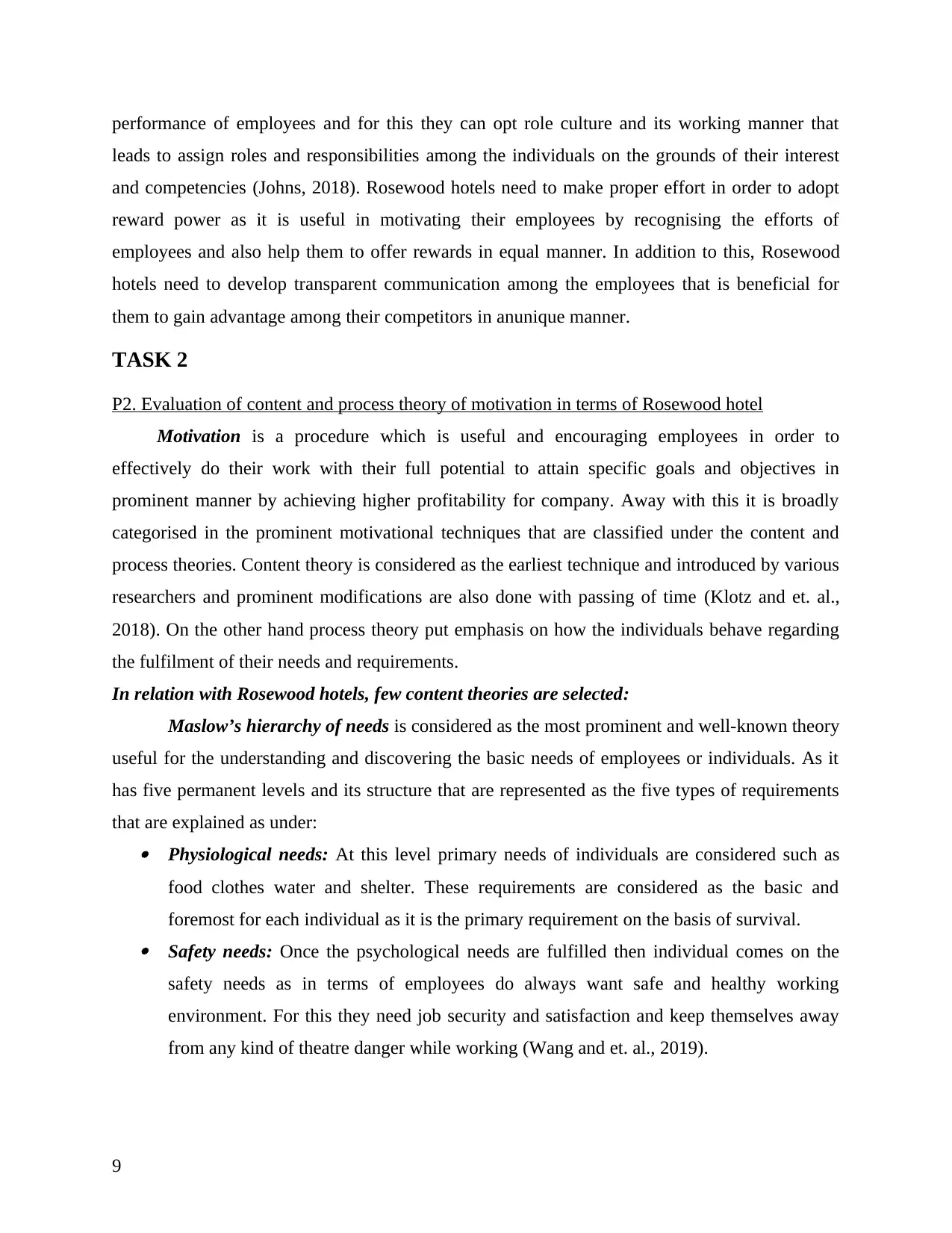
performance of employees and for this they can opt role culture and its working manner that
leads to assign roles and responsibilities among the individuals on the grounds of their interest
and competencies (Johns, 2018). Rosewood hotels need to make proper effort in order to adopt
reward power as it is useful in motivating their employees by recognising the efforts of
employees and also help them to offer rewards in equal manner. In addition to this, Rosewood
hotels need to develop transparent communication among the employees that is beneficial for
them to gain advantage among their competitors in anunique manner.
TASK 2
P2. Evaluation of content and process theory of motivation in terms of Rosewood hotel
Motivation is a procedure which is useful and encouraging employees in order to
effectively do their work with their full potential to attain specific goals and objectives in
prominent manner by achieving higher profitability for company. Away with this it is broadly
categorised in the prominent motivational techniques that are classified under the content and
process theories. Content theory is considered as the earliest technique and introduced by various
researchers and prominent modifications are also done with passing of time (Klotz and et. al.,
2018). On the other hand process theory put emphasis on how the individuals behave regarding
the fulfilment of their needs and requirements.
In relation with Rosewood hotels, few content theories are selected:
Maslow’s hierarchy of needs is considered as the most prominent and well-known theory
useful for the understanding and discovering the basic needs of employees or individuals. As it
has five permanent levels and its structure that are represented as the five types of requirements
that are explained as under: Physiological needs: At this level primary needs of individuals are considered such as
food clothes water and shelter. These requirements are considered as the basic and
foremost for each individual as it is the primary requirement on the basis of survival. Safety needs: Once the psychological needs are fulfilled then individual comes on the
safety needs as in terms of employees do always want safe and healthy working
environment. For this they need job security and satisfaction and keep themselves away
from any kind of theatre danger while working (Wang and et. al., 2019).
9
leads to assign roles and responsibilities among the individuals on the grounds of their interest
and competencies (Johns, 2018). Rosewood hotels need to make proper effort in order to adopt
reward power as it is useful in motivating their employees by recognising the efforts of
employees and also help them to offer rewards in equal manner. In addition to this, Rosewood
hotels need to develop transparent communication among the employees that is beneficial for
them to gain advantage among their competitors in anunique manner.
TASK 2
P2. Evaluation of content and process theory of motivation in terms of Rosewood hotel
Motivation is a procedure which is useful and encouraging employees in order to
effectively do their work with their full potential to attain specific goals and objectives in
prominent manner by achieving higher profitability for company. Away with this it is broadly
categorised in the prominent motivational techniques that are classified under the content and
process theories. Content theory is considered as the earliest technique and introduced by various
researchers and prominent modifications are also done with passing of time (Klotz and et. al.,
2018). On the other hand process theory put emphasis on how the individuals behave regarding
the fulfilment of their needs and requirements.
In relation with Rosewood hotels, few content theories are selected:
Maslow’s hierarchy of needs is considered as the most prominent and well-known theory
useful for the understanding and discovering the basic needs of employees or individuals. As it
has five permanent levels and its structure that are represented as the five types of requirements
that are explained as under: Physiological needs: At this level primary needs of individuals are considered such as
food clothes water and shelter. These requirements are considered as the basic and
foremost for each individual as it is the primary requirement on the basis of survival. Safety needs: Once the psychological needs are fulfilled then individual comes on the
safety needs as in terms of employees do always want safe and healthy working
environment. For this they need job security and satisfaction and keep themselves away
from any kind of theatre danger while working (Wang and et. al., 2019).
9
⊘ This is a preview!⊘
Do you want full access?
Subscribe today to unlock all pages.

Trusted by 1+ million students worldwide
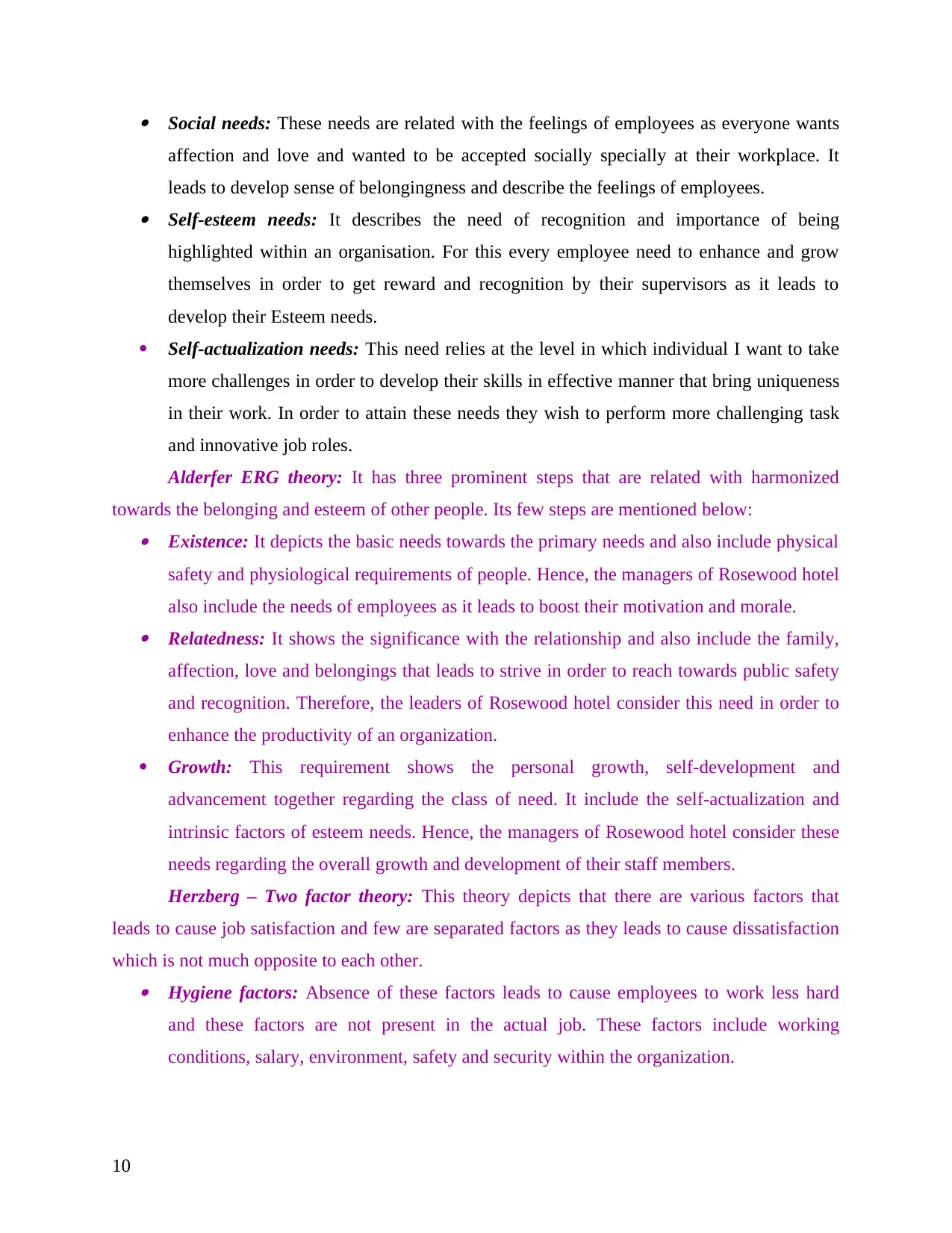
Social needs: These needs are related with the feelings of employees as everyone wants
affection and love and wanted to be accepted socially specially at their workplace. It
leads to develop sense of belongingness and describe the feelings of employees. Self-esteem needs: It describes the need of recognition and importance of being
highlighted within an organisation. For this every employee need to enhance and grow
themselves in order to get reward and recognition by their supervisors as it leads to
develop their Esteem needs.
Self-actualization needs: This need relies at the level in which individual I want to take
more challenges in order to develop their skills in effective manner that bring uniqueness
in their work. In order to attain these needs they wish to perform more challenging task
and innovative job roles.
Alderfer ERG theory: It has three prominent steps that are related with harmonized
towards the belonging and esteem of other people. Its few steps are mentioned below: Existence: It depicts the basic needs towards the primary needs and also include physical
safety and physiological requirements of people. Hence, the managers of Rosewood hotel
also include the needs of employees as it leads to boost their motivation and morale. Relatedness: It shows the significance with the relationship and also include the family,
affection, love and belongings that leads to strive in order to reach towards public safety
and recognition. Therefore, the leaders of Rosewood hotel consider this need in order to
enhance the productivity of an organization.
Growth: This requirement shows the personal growth, self-development and
advancement together regarding the class of need. It include the self-actualization and
intrinsic factors of esteem needs. Hence, the managers of Rosewood hotel consider these
needs regarding the overall growth and development of their staff members.
Herzberg – Two factor theory: This theory depicts that there are various factors that
leads to cause job satisfaction and few are separated factors as they leads to cause dissatisfaction
which is not much opposite to each other. Hygiene factors: Absence of these factors leads to cause employees to work less hard
and these factors are not present in the actual job. These factors include working
conditions, salary, environment, safety and security within the organization.
10
affection and love and wanted to be accepted socially specially at their workplace. It
leads to develop sense of belongingness and describe the feelings of employees. Self-esteem needs: It describes the need of recognition and importance of being
highlighted within an organisation. For this every employee need to enhance and grow
themselves in order to get reward and recognition by their supervisors as it leads to
develop their Esteem needs.
Self-actualization needs: This need relies at the level in which individual I want to take
more challenges in order to develop their skills in effective manner that bring uniqueness
in their work. In order to attain these needs they wish to perform more challenging task
and innovative job roles.
Alderfer ERG theory: It has three prominent steps that are related with harmonized
towards the belonging and esteem of other people. Its few steps are mentioned below: Existence: It depicts the basic needs towards the primary needs and also include physical
safety and physiological requirements of people. Hence, the managers of Rosewood hotel
also include the needs of employees as it leads to boost their motivation and morale. Relatedness: It shows the significance with the relationship and also include the family,
affection, love and belongings that leads to strive in order to reach towards public safety
and recognition. Therefore, the leaders of Rosewood hotel consider this need in order to
enhance the productivity of an organization.
Growth: This requirement shows the personal growth, self-development and
advancement together regarding the class of need. It include the self-actualization and
intrinsic factors of esteem needs. Hence, the managers of Rosewood hotel consider these
needs regarding the overall growth and development of their staff members.
Herzberg – Two factor theory: This theory depicts that there are various factors that
leads to cause job satisfaction and few are separated factors as they leads to cause dissatisfaction
which is not much opposite to each other. Hygiene factors: Absence of these factors leads to cause employees to work less hard
and these factors are not present in the actual job. These factors include working
conditions, salary, environment, safety and security within the organization.
10
Paraphrase This Document
Need a fresh take? Get an instant paraphrase of this document with our AI Paraphraser
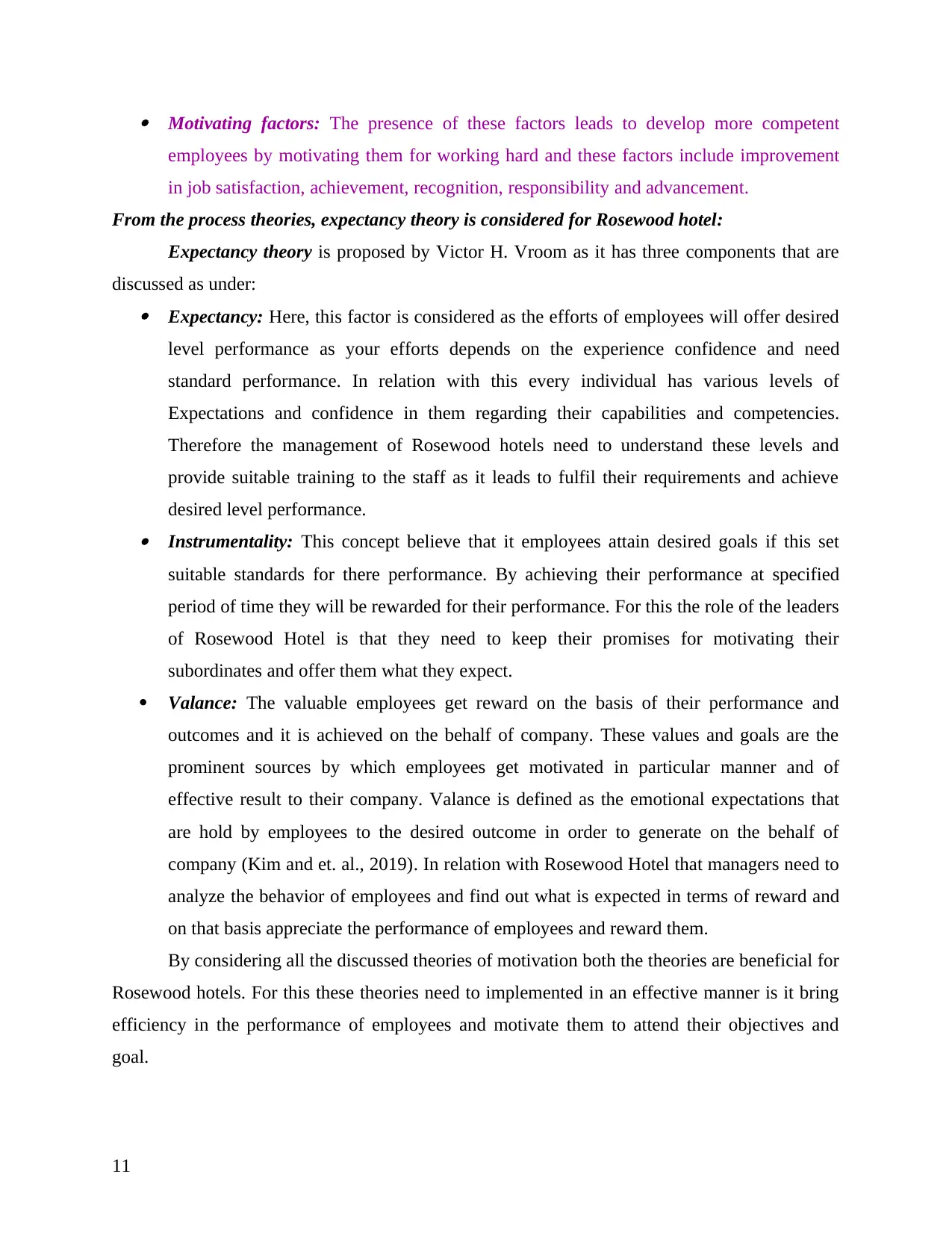
Motivating factors: The presence of these factors leads to develop more competent
employees by motivating them for working hard and these factors include improvement
in job satisfaction, achievement, recognition, responsibility and advancement.
From the process theories, expectancy theory is considered for Rosewood hotel:
Expectancy theory is proposed by Victor H. Vroom as it has three components that are
discussed as under: Expectancy: Here, this factor is considered as the efforts of employees will offer desired
level performance as your efforts depends on the experience confidence and need
standard performance. In relation with this every individual has various levels of
Expectations and confidence in them regarding their capabilities and competencies.
Therefore the management of Rosewood hotels need to understand these levels and
provide suitable training to the staff as it leads to fulfil their requirements and achieve
desired level performance. Instrumentality: This concept believe that it employees attain desired goals if this set
suitable standards for there performance. By achieving their performance at specified
period of time they will be rewarded for their performance. For this the role of the leaders
of Rosewood Hotel is that they need to keep their promises for motivating their
subordinates and offer them what they expect.
Valance: The valuable employees get reward on the basis of their performance and
outcomes and it is achieved on the behalf of company. These values and goals are the
prominent sources by which employees get motivated in particular manner and of
effective result to their company. Valance is defined as the emotional expectations that
are hold by employees to the desired outcome in order to generate on the behalf of
company (Kim and et. al., 2019). In relation with Rosewood Hotel that managers need to
analyze the behavior of employees and find out what is expected in terms of reward and
on that basis appreciate the performance of employees and reward them.
By considering all the discussed theories of motivation both the theories are beneficial for
Rosewood hotels. For this these theories need to implemented in an effective manner is it bring
efficiency in the performance of employees and motivate them to attend their objectives and
goal.
11
employees by motivating them for working hard and these factors include improvement
in job satisfaction, achievement, recognition, responsibility and advancement.
From the process theories, expectancy theory is considered for Rosewood hotel:
Expectancy theory is proposed by Victor H. Vroom as it has three components that are
discussed as under: Expectancy: Here, this factor is considered as the efforts of employees will offer desired
level performance as your efforts depends on the experience confidence and need
standard performance. In relation with this every individual has various levels of
Expectations and confidence in them regarding their capabilities and competencies.
Therefore the management of Rosewood hotels need to understand these levels and
provide suitable training to the staff as it leads to fulfil their requirements and achieve
desired level performance. Instrumentality: This concept believe that it employees attain desired goals if this set
suitable standards for there performance. By achieving their performance at specified
period of time they will be rewarded for their performance. For this the role of the leaders
of Rosewood Hotel is that they need to keep their promises for motivating their
subordinates and offer them what they expect.
Valance: The valuable employees get reward on the basis of their performance and
outcomes and it is achieved on the behalf of company. These values and goals are the
prominent sources by which employees get motivated in particular manner and of
effective result to their company. Valance is defined as the emotional expectations that
are hold by employees to the desired outcome in order to generate on the behalf of
company (Kim and et. al., 2019). In relation with Rosewood Hotel that managers need to
analyze the behavior of employees and find out what is expected in terms of reward and
on that basis appreciate the performance of employees and reward them.
By considering all the discussed theories of motivation both the theories are beneficial for
Rosewood hotels. For this these theories need to implemented in an effective manner is it bring
efficiency in the performance of employees and motivate them to attend their objectives and
goal.
11
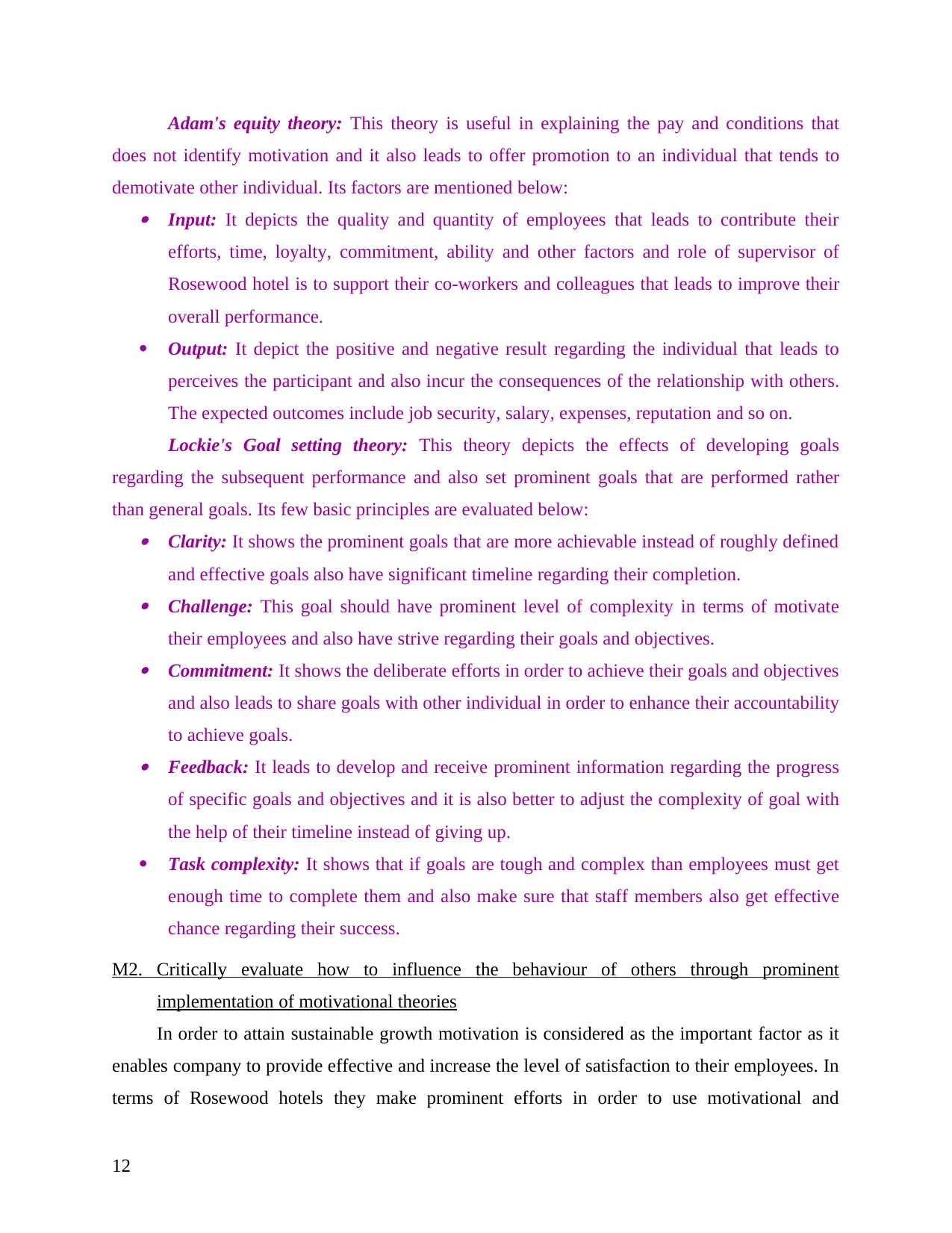
Adam's equity theory: This theory is useful in explaining the pay and conditions that
does not identify motivation and it also leads to offer promotion to an individual that tends to
demotivate other individual. Its factors are mentioned below: Input: It depicts the quality and quantity of employees that leads to contribute their
efforts, time, loyalty, commitment, ability and other factors and role of supervisor of
Rosewood hotel is to support their co-workers and colleagues that leads to improve their
overall performance.
Output: It depict the positive and negative result regarding the individual that leads to
perceives the participant and also incur the consequences of the relationship with others.
The expected outcomes include job security, salary, expenses, reputation and so on.
Lockie's Goal setting theory: This theory depicts the effects of developing goals
regarding the subsequent performance and also set prominent goals that are performed rather
than general goals. Its few basic principles are evaluated below: Clarity: It shows the prominent goals that are more achievable instead of roughly defined
and effective goals also have significant timeline regarding their completion. Challenge: This goal should have prominent level of complexity in terms of motivate
their employees and also have strive regarding their goals and objectives. Commitment: It shows the deliberate efforts in order to achieve their goals and objectives
and also leads to share goals with other individual in order to enhance their accountability
to achieve goals. Feedback: It leads to develop and receive prominent information regarding the progress
of specific goals and objectives and it is also better to adjust the complexity of goal with
the help of their timeline instead of giving up.
Task complexity: It shows that if goals are tough and complex than employees must get
enough time to complete them and also make sure that staff members also get effective
chance regarding their success.
M2. Critically evaluate how to influence the behaviour of others through prominent
implementation of motivational theories
In order to attain sustainable growth motivation is considered as the important factor as it
enables company to provide effective and increase the level of satisfaction to their employees. In
terms of Rosewood hotels they make prominent efforts in order to use motivational and
12
does not identify motivation and it also leads to offer promotion to an individual that tends to
demotivate other individual. Its factors are mentioned below: Input: It depicts the quality and quantity of employees that leads to contribute their
efforts, time, loyalty, commitment, ability and other factors and role of supervisor of
Rosewood hotel is to support their co-workers and colleagues that leads to improve their
overall performance.
Output: It depict the positive and negative result regarding the individual that leads to
perceives the participant and also incur the consequences of the relationship with others.
The expected outcomes include job security, salary, expenses, reputation and so on.
Lockie's Goal setting theory: This theory depicts the effects of developing goals
regarding the subsequent performance and also set prominent goals that are performed rather
than general goals. Its few basic principles are evaluated below: Clarity: It shows the prominent goals that are more achievable instead of roughly defined
and effective goals also have significant timeline regarding their completion. Challenge: This goal should have prominent level of complexity in terms of motivate
their employees and also have strive regarding their goals and objectives. Commitment: It shows the deliberate efforts in order to achieve their goals and objectives
and also leads to share goals with other individual in order to enhance their accountability
to achieve goals. Feedback: It leads to develop and receive prominent information regarding the progress
of specific goals and objectives and it is also better to adjust the complexity of goal with
the help of their timeline instead of giving up.
Task complexity: It shows that if goals are tough and complex than employees must get
enough time to complete them and also make sure that staff members also get effective
chance regarding their success.
M2. Critically evaluate how to influence the behaviour of others through prominent
implementation of motivational theories
In order to attain sustainable growth motivation is considered as the important factor as it
enables company to provide effective and increase the level of satisfaction to their employees. In
terms of Rosewood hotels they make prominent efforts in order to use motivational and
12
⊘ This is a preview!⊘
Do you want full access?
Subscribe today to unlock all pages.

Trusted by 1+ million students worldwide
1 out of 22
Related Documents
Your All-in-One AI-Powered Toolkit for Academic Success.
+13062052269
info@desklib.com
Available 24*7 on WhatsApp / Email
![[object Object]](/_next/static/media/star-bottom.7253800d.svg)
Unlock your academic potential
Copyright © 2020–2026 A2Z Services. All Rights Reserved. Developed and managed by ZUCOL.




